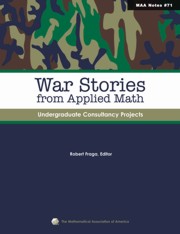
- This book is no longer available to purchase from Cambridge Core
- Publisher:
- Mathematical Association of America
- Online publication date:
- October 2011
- Print publication year:
- 2007
- Online ISBN:
- 9780883859773
- Series:
- MAA Notes

This book deals with issues involved in setting up and running a program which allows undergraduate students to work on problems from real world sources. A number of practitioners share their experiences with the reader. How are such programs set up and what resources are required? How are clients found? What problems are suitable for students to work on? What difficulties can be anticipated and how can they be resolved? What benefits does the client derive from the students' work and what do the students get out of such projects? These issues and others like them are explored in a number of different academic environments. It is the contention of this book that students develop an appreciation of mathematics and its usefulness by engaging in programs such as those described here. Furthermore it is possible to develop such programs for a variety of student audiences over a wide spectrum of colleges and universities. A chapter is devoted to relevant materials available from the Consortium for Mathematics and its Applications (COMAP). Lists of student projects and examples of their work are provided. There is also a discussion of the pros and cons of consultancy projects by representatives of industry familiar with such project.
This is a valuable resource for anyone running, planning or thinking about setting up student consultancy projects. The book offers the benefit of many years of collective experience in making these projects work. Although virtually everyone involved is positive about the programs, no one minimizes the difficulties. Also, the 'mathematics' part of 'applications of math' should be taken broadly to include statistics, operations research, as well as some aspects of computer science, software development, and occasionally even some engineering.
Bill Satzer Source: MAA Reviews Online
 Loading metrics...
Loading metrics...
* Views captured on Cambridge Core between #date#. This data will be updated every 24 hours.
Usage data cannot currently be displayed.